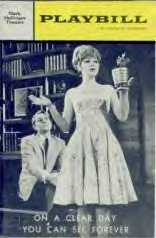
Anyone Can Whistle is a musical with music and lyrics by Stephen Sondheim, and a book by Arthur Laurents. Described as "a satire on conformity and the insanity of the so-called sane," the show tells a story of an economically depressed town whose corrupt mayor decides to create a fake miracle in order to attract tourists. The phony miracle draws the attention of an emotionally inhibited nurse, a crowd of inmates from a local asylum, and a doctor with secrets of his own.

Joseph Harry Fowler Connick Jr. is an American singer, pianist, composer, actor, and former television host. As of 2019, he has sold over 30 million records worldwide. Connick is ranked among the top 60 best-selling male artists in the United States by the Recording Industry Association of America, with 16 million in certified sales. He has had seven top 20 US albums, and ten number-one US jazz albums, earning more number-one albums than any other artist in U.S. jazz chart history as of 2009.

The Pajama Game is a musical based on the 1953 novel 7½ Cents by Richard Bissell. The book is by George Abbott and Richard Bissell; the music and lyrics are by Richard Adler and Jerry Ross. Dances were staged by Bob Fosse in his choreography debut. The story deals with labor troubles and romance in a pajama factory.
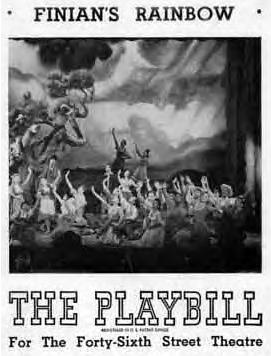
Finian's Rainbow is a musical with a book by E. Y. Harburg and Fred Saidy, lyrics by Harburg, and music by Burton Lane, produced by Lee Sabinson. The original 1947 Broadway production ran for 725 performances, while a film version was released in 1968 and several revivals have followed.
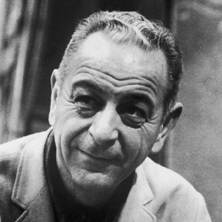
Burton Lane was an American composer and lyricist primarily known for his theatre and film scores. His most popular and successful works include Finian's Rainbow in 1947 and On a Clear Day You Can See Forever in 1965.

The Last Five Years is a musical written by Jason Robert Brown. It premiered at Chicago's Northlight Theatre in 2001 and was then produced Off-Broadway in March 2002. Since then it has had numerous productions both in the United States and internationally.

John Cullum is an American actor and singer. He has appeared in many stage musicals and dramas, including Shenandoah (1975) and On the Twentieth Century (1978), winning the Tony Award for Best Leading Actor in a Musical for each. In 1966 he gained his first Tony nomination as the lead in On a Clear Day You Can See Forever, in which he introduced the title song, and more recently received Tony nominations for Urinetown The Musical (2002) and as Best Featured Actor in the revival of 110 in the Shade (2007).
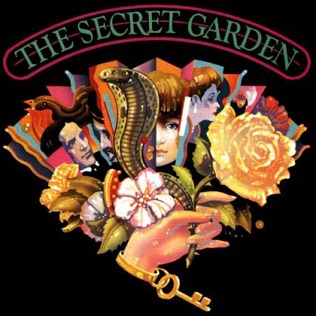
The Secret Garden is a musical based on the 1911 novel of the same name by Frances Hodgson Burnett. The musical's script and lyrics are by Marsha Norman, with music by Lucy Simon. It premiered on Broadway in 1991 and ran for 709 performances.

Jenna Russell is an English actress and singer. She has appeared on the stage in London in both musicals and dramas, as well as appearing with the Royal Shakespeare Company. She performed the role of Dot in Sunday in the Park with George in the West End and on Broadway, receiving the Tony Award nomination and the 2006 Olivier Award for Best Actress in a Musical for her role. She has also appeared in several television series, including Born and Bred and EastEnders.

Ellen Greene is an American actress and singer. She has had a long and varied career as a singer, particularly in cabaret, as an actress and singer in numerous stage productions, particularly musical theatre, as well as having performed in many films and television series. Her best-known roles are as Audrey in the original stage play and movie adaptation of Little Shop of Horrors, and as Vivian Charles in the ABC series Pushing Daisies.
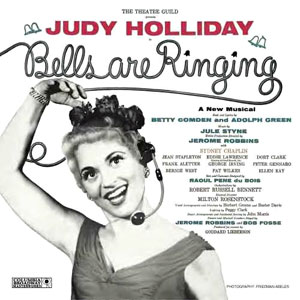
Bells Are Ringing is a musical with a book and lyrics by Betty Comden and Adolph Green and music by Jule Styne. The story revolves around Ella, who works at an answering service, and the characters that she meets there. The main character was based on Mary Printz, who worked for Green's answering service. Three of the show's tunes, "Long Before I Knew You", "Just in Time", and "The Party's Over", became standards.

Side Show is a musical by Bill Russell and Henry Krieger (music) based on the lives of Daisy and Violet Hilton, conjoined twins who became famous stage performers in the 1930s.
Melissa Errico is an American actress, singer, recording artist and writer. She is known for her Broadway musical roles such as Eliza Doolittle in My Fair Lady and the title role in One Touch of Venus, as well as her recordings of musical theater classics, including albums of songs by Stephen Sondheim and Michel Legrand. In recent years she has become a contributing writer to The New York Times and served on the National Endowment for the Arts.
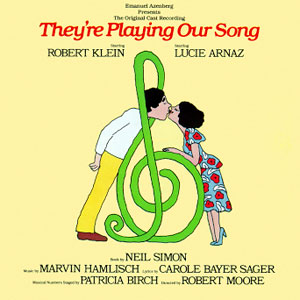
They're Playing Our Song is a musical with a book by Neil Simon, lyrics by Carole Bayer Sager, and music by Marvin Hamlisch.

The Visit is a musical with a book by Terrence McNally, lyrics by Fred Ebb, and music by John Kander.

Nice Work If You Can Get It is a musical featuring songs by George and Ira Gershwin, with a book written by Joe DiPietro, and based on material by Guy Bolton and P. G. Wodehouse. Nice Work premiered on Broadway in April 2012.

On a Clear Day You Can See Forever is a 1970 American musical comedy-drama fantasy film starring Barbra Streisand and Yves Montand and directed by Vincente Minnelli. The screenplay by Alan Jay Lerner is adapted from his book for the 1965 stage production of the same name. The songs feature lyrics by Lerner and music by Burton Lane. Yves portrays a hypnotherapist who discovers that his meek patient (Streisand) has an enigmatic past life as a 19th century aristocrat and begins to fall in love with her.
Christine Jones is an American scenic designer on Broadway. Her best-known designs include Spring Awakening, American Idiot, and Harry Potter and the Cursed Child. In 2010, she created an experimental, two-week project called Theatre for One in which one actor performs for one audience member. It was repeated in 2015. She is a professor at New York University and a lecturer at Princeton University.
Jessica Ruth Mueller is an American actress and singer. She started her acting career in Chicago and won two Joseph Jefferson Awards in 2008 and 2011 for her roles as Carrie Pipperidge in Carousel and Amalia Balash in She Loves Me. In 2011, she moved to New York City to star in a Broadway revival of musical On a Clear Day You Can See Forever, for which she was nominated for a Tony Award for Best Featured Actress in a Musical. She won the 2014 Tony Award for Best Actress in a Leading Role in a Musical for her performance as Carole King in Beautiful: The Carole King Musical. She went on to receive two additional Best Actress in a Musical Tony Award nominations for her leading roles in Waitress (2016) and the Broadway revival of Carousel (2018).

Beautiful: The Carole King Musical is a jukebox musical with a book by Douglas McGrath that tells the story of the early life and career of Carole King, using songs that she wrote, often together with Gerry Goffin, and other contemporary songs by Barry Mann, Cynthia Weil, Phil Spector and others.
